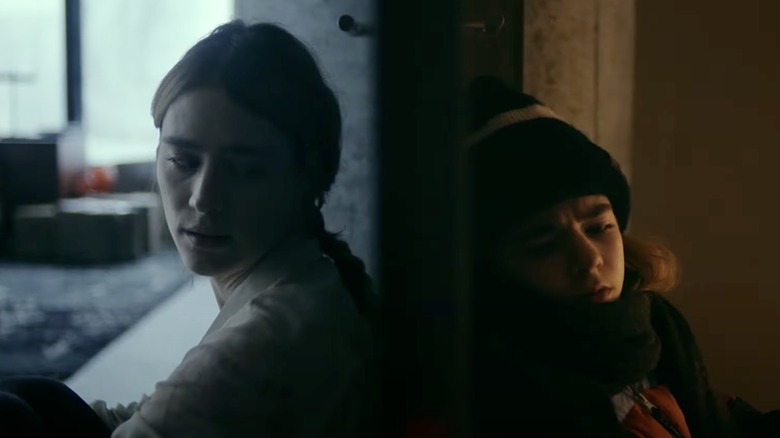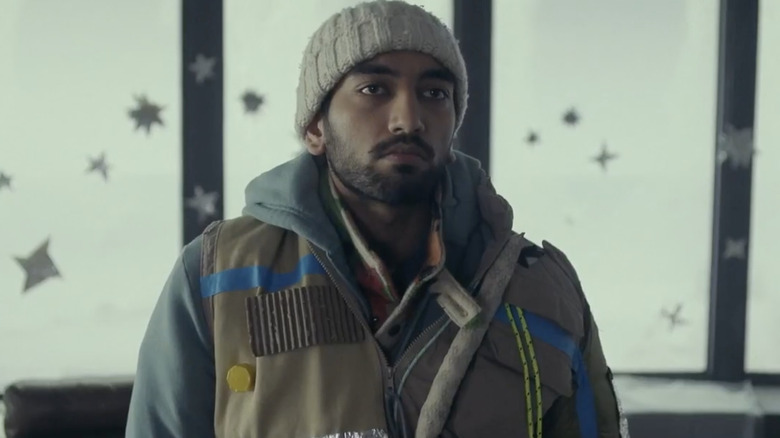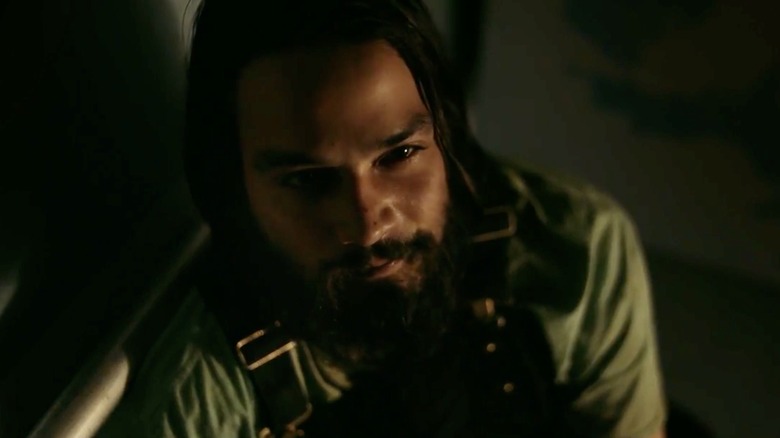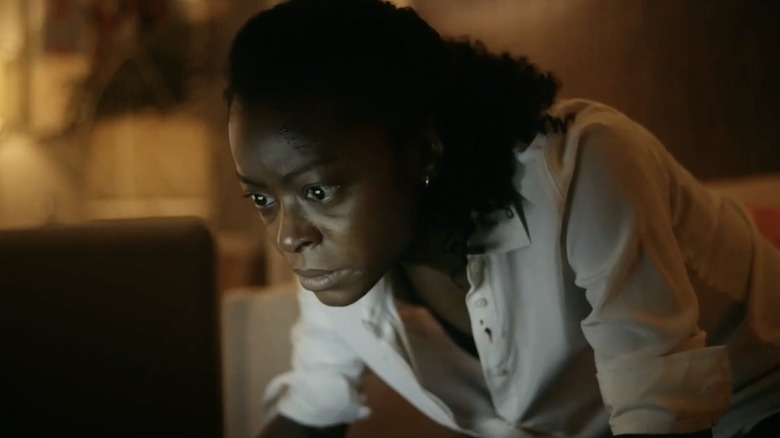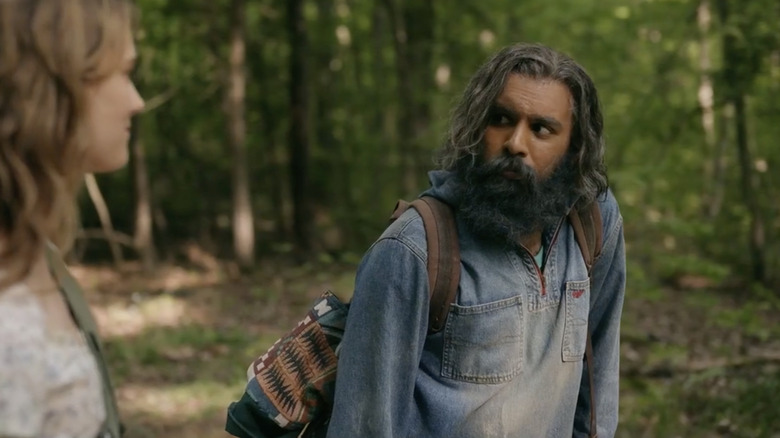Station Eleven Spoiler Review: Finding Hope Among Harsh Times Through Creativity And Serendipity
HBO Max's "Station Eleven" has been structured in such a way that the shape of the narrative was not immediately evident from its first three episodes, which premiered in mid-December and which we covered in our non-spoiler review. It was only as the weeks went on that it became fully clear what this sublime miniseries from showrunner Patrick Somerville was doing as it alternated between odd-numbered, character-centric flashback episodes and even-numbered ones rooted in the post-pandemic present.
The show "Lost," with its similar time-jumping nature and focus on connections or degrees of separation between people, is one obvious comparison, except that "Station Eleven" began by orbiting Jeevan (Himesh Patel) and didn't introduce the grown-up version of its ensemble lead, Kirsten (Mackenzie Davis), until the very end of episode 1. Kirsten took center stage in episode 2 as a member of the Traveling Symphony, a troupe of Shakespearean actors who move from place to place, staging "Hamlet" by firelight in Year 20 of a world that has been ravaged by a fictional flu with a survival rate of 1 in 1000.
Episode 3, however, pivoted back to the past and the POV of Miranda (Danielle Deadwyler), who turned out to be more of a recurring character than a main character. It wasn't until the show's second week and fourth and fifth episodes that the pattern of "Station Eleven" began to feel familiar as Kirsten's Year 20 storyline resumed and Clark (David Wilmot) stepped into the spotlight more. Now, the series has pulled into the station, as it were, with its 10th and final episode airing on January 13, 2022.
Since "Station Eleven" is available to stream now in its entirety, we'll be delving into full spoilers here, up to and including its tearjerker of a finale.
The Zone of Positivity
"Station Eleven" entered production before the global spread of COVID-19, and though it wasn't built to address life in a real pandemic head-on, it has made a strong case for itself as the best piece of art to do so in the 2020s. "Art" is the key word here. Clark may insist that the Traveling Symphony's "Hamlet" production isn't art therapy, but it does showcase the healing power of creativity and catharsis.
This is a show where people stuck in an apartment without heat keep themselves warm by rapping. Jeevan's brother, Frank (Nabhaan Rizwan), hobbles in on a cane and sets a tape deck down on the table in front of Jeevan and Young Kirsten, played by the phenomenal young actress, Matilda Lawler. Frank has looped a sound clip of a man laughing into a hip-hop beat, and before the scene is over, he has climbed up onto his chair and gotten his roommates on their feet, bouncing along as he delivers an electrifying lyrical flow. The words come spilling out of his mouth and he says, "Get in the zone of positivity, not negativity, cuz we gotta strive for longevity."
That's just one mode of creativity on display in "Station Eleven." The show takes its name from Miranda's homemade graphic novel, which becomes an almost religious text for a group of lost children, led by the Prophet (Daniel Zovatto). All of these people inhabit a post-apocalyptic landscape where, as the title of one episode tells us, "Survival Is Not Sufficient." There are dangers present — the children themselves carry landmines — but the adults are also overgrown kids with the power to detonate relationships. Whether it be through art or reunion and reconciliation with estranged loved ones, their souls need sustenance just as much as their bodies.
Pain on the Canvas
From the moment the Prophet showed up at Kirsten's swimming hole, "Station Eleven" put its characters on a collision course, and viewers had every right to expect that it would end in death and tragedy for one or more of them, just as it did with the Prince of Denmark. The show is not without its casualties, with Miranda and her ex-husband, Arthur (Gael Garcia Bernal), succumbing to the flu and the Traveling Symphony co-founders, Sarah (Lori Petty) and Gil (David Cross), both dying of other causes. A home invader kills Frank and a bandit in the woods dispatches the Prophet's young lieutenant, Cody (Luca Villacis), with a poison dart.
Having a character be physically present in their memories, observing and interacting with them, is a visual storytelling device that doesn't always justify itself, but in "Station Eleven," the poison's effect on Kirsten is representative, in a way, of how inner demons can be useful for introspection before one exorcises them. That's what artists do: they put their pain on the canvas and confront it through mimesis.
What's refreshing about "Station Eleven" is the ray of optimism that filters through it even as characters face grim circumstances and endure loss. Misunderstandings boil over into conflict and people wrong each other yet are still capable of resolving their differences.
The reveal in episode 5 that the Prophet is Tyler, the runaway son of Arthur and Elizabeth (Caitlin Fitzgerald), is not entirely unexpected, but when it comes, it serves to realign the conflict as more of a personal dispute between family members instead of the typical warring tribes of apocalypse survivors. It demystifies him, the shadowy cult leader, as more of a Peter Pan type. He warns against the Museum of Civilization — where the Traveling Symphony is headed — but rather than being some other Big Bad, the man behind the curtain there, Clark, is someone we've already met with his own human foibles.
Damage and Escape
The finale of "Station Eleven," lensed by cinematographer Steven Cosens, begins with Miranda talking about logistics — "the path things take from A to B." She's creative but works slow; she considers herself a ghost who doesn't stay in touch with people; and she's sealed herself up in a room in Asia as the world is ending. (I can relate on all counts, just as I can relate to lines like, "Journalists have to go outside.") Yet the relic of the story she's drawn binds the show's characters, and her talk of logistics gives expression to what we've seen on "Station Eleven," which is people crossing paths, coming together and drifting apart at various points in their lives.
"I remember damage," Miranda says. "And escape." At a young age, she lost her family to a hurricane named Hugo, and after that, art became her sanctuary. On her last night on Earth, she finds herself on the phone, pleading with a pilot named Hugo to keep the sick people on his plane quarantined so as to save the lives of those in the Severn City Airport.
The paths of Kirsten, Tyler, Clark, and Elizabeth, all of whom, like Miranda, share a connection with Arthur, converge half a world away at that same airport. It turns out Clark and Elizabeth, now older and white-haired, are still in the place where Tyler left them all those years ago when he ran away after seeing a sick man gunned down.
He burns down the Museum of Civilization and they handcuff him to a pipe. It's Kirsten who devises the plan to have them work through their issues via theater, with Tyler playing Prince Hamlet and Clark and Elizabeth playing King Claudius and Queen Gertrude. Arthur realizes that he met Kirsten when she was a girl and it's only then that he — the resentful "CEO whisperer" turned community leader — agrees to her plan.
Right before he goes onstage, Kirsten reminds Tyler that it didn't work when she herself stabbed him. Alexandra (Philippine Velge) has put a real knife in his hands, but he drops it, and Elizabeth later agrees to leave with him.
As the Wheel Turns
The thing that really clinched "Station Eleven" as a winner for me is when it reunited Kirsten and Jeevan at the end. In the penultimate, Jeevan-centric episode, the series showed us how this guy with the fuzzy past as a culture critic became an improbable kidnappee and doctor-in-training for a community of pregnant women with synced menstrual cycles. He got mauled by a wolf and lost a few toes, but he didn't lose his life, and he even found love, someone who could give him a much-needed hug and who could get him to truthfully admit, "I'm not okay."
Years later, after he's gone gray and made a life for himself elsewhere, Jeevan shows up at the airport to attend to Sarah. He's her angel of mercy, and at first, it seems like he and Kirsten will just miss each other and remain ships that passed in the night. Then, they see each other across the airport, and "Station Eleven" lays a benediction on us in the form of their tearful embrace.
The final image of the series is that of a fork in the road, two paths diverging in a wood like something out of a Robert Frost poem. Kirsten and Jeevan go their separate ways, with the promise that the Symphony's touring "Wheel" will loop back around to the airport and Jeevan will bring his family next time. The series began with these two characters, and Jeevan's fate was always murky, if not presumed dead, so it was nice to watch him split off on his own quirky adventure instead of just being killed off.
Seeing it come full circle back to him and Kirsten, after all they've been through, summons the feels and it ends the series on a hopeful, happily-ever-after note. "Station Eleven" presents a world where human bonds and creativity are the fire that warm chilled hearts. When Frank says, "This strange and awful time was the happiest of my life," he could just as easily be talking about the enrichment of shows like this amid life in the early 2020s.
